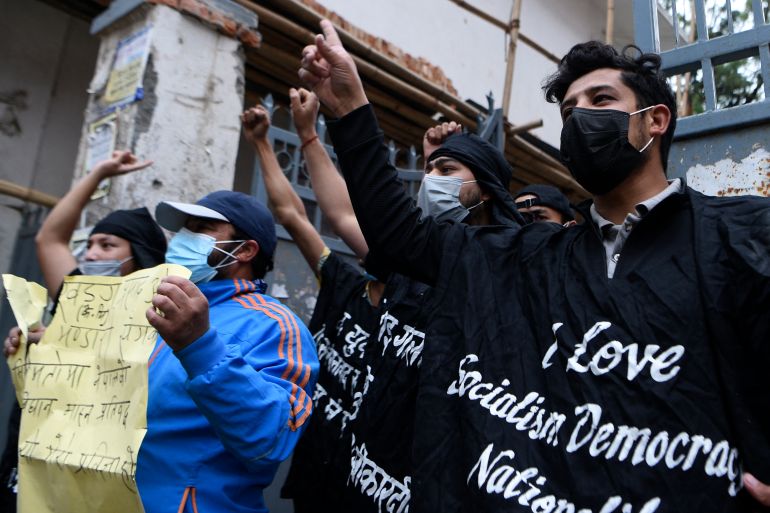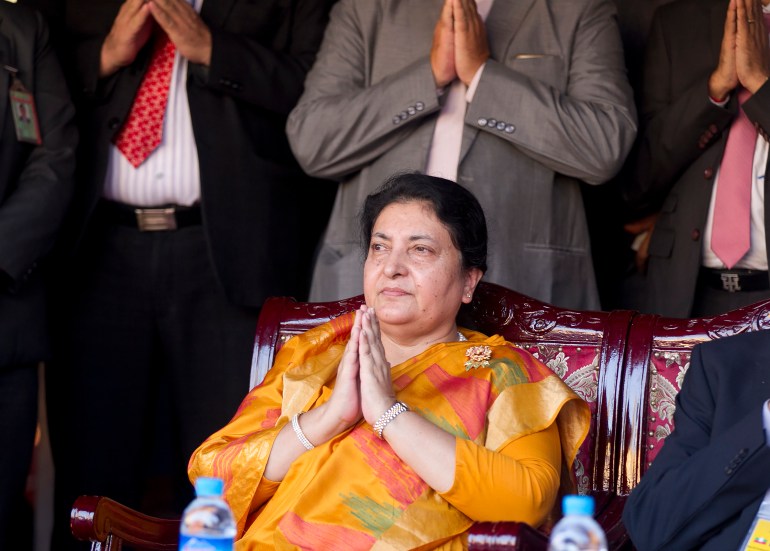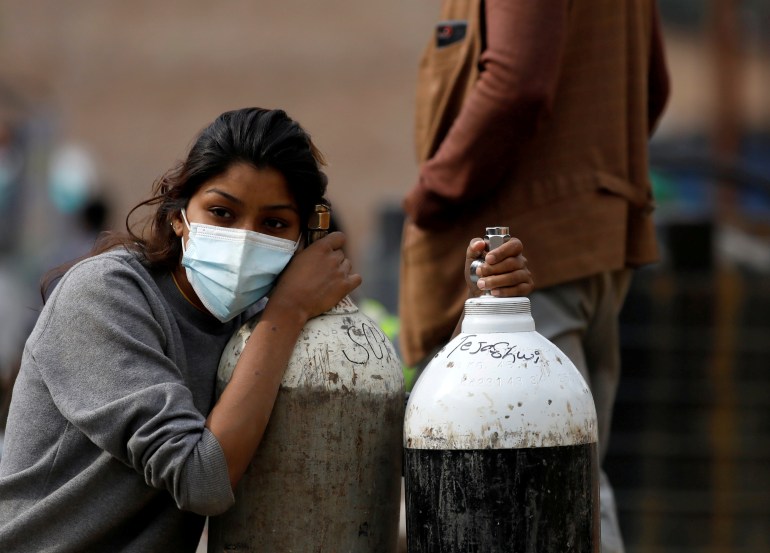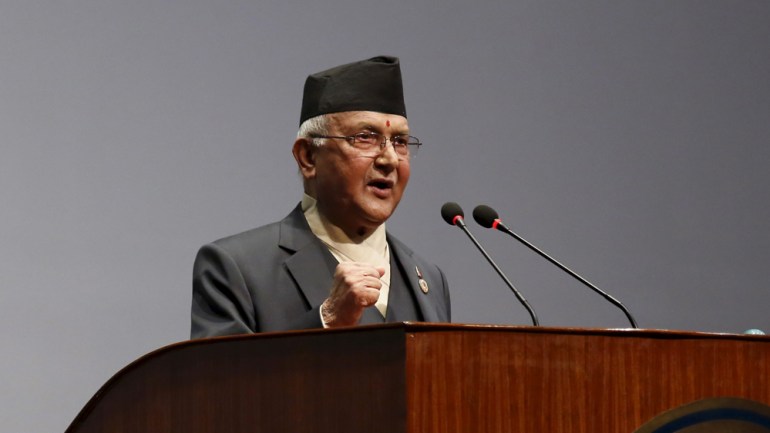Nepal plunges into crisis – again. Here’s what you need to know
Nepal is in renewed turmoil after president dissolves parliament amid a worsening COVID-19 outbreak. Here’s key questions answered.

Kathmandu, Nepal – Nepal’s president has dissolved the parliament for a second time in less than six months and scheduled snap elections, prompting court challenges and plunging the country into fresh political turmoil as it battles a “catastrophic” surge in coronavirus infections.
With the Supreme Court set to hear petitions against President Bidya Devi Bhandari’s order on Thursday, dozens of people have rallied in several Nepalese cities against what they say is a bid by the head of state to protect Prime Minister Khadga Prasad Sharma Oli’s political career.
Keep reading
list of 4 itemsAs COVID wave rages in Nepal, hospitals run out of beds, oxygen
Nepal PM loses confidence vote amid surging pandemic
Nepal’s Supreme Court orders reinstatement of Parliament
Oli, 69, had renewed calls for a fresh election after he lost a confidence vote earlier this month.
Critics say Bhandari’s midnight order on Saturday came after it became clear that Sher Bahadur Deuba from the opposition party, the Nepali Congress, had obtained the support required to become the South Asian nation’s next prime minister.
The crisis is threatening renewed instability in Nepal, which saw 10 changes in governments in as many years prior to the 2017 election that brought Oli and his coalition of Communist parties to power.
There is also fear the turmoil could worsen Nepal’s COVID-19 crisis.
Already, hospitals in the country are running out of oxygen and beds, while some regions are resorting to mass cremations as the death toll mounts.
“This is not the right time for power politics,” said Rojina Shrestha, a lecturer at the Rapti Babai Campus in the western city of Tulsipur. “The politicians’ immediate focus should be on obtaining oxygen and vaccines. People are dying. Dissolving the parliament and holding a fresh election will not help those battling the pandemic.”
How did things get here?
The latest crisis has its immediate roots in the fracturing of the Nepal Communist Party (NCP), which was formed in 2018 through a merger between the Communist Party of Nepal – Unified Marxist Leninist (CPN-UML) and the Communist Party of Nepal (Maoist Centre). Since last year, a faction of the NCP has been accusing Oli of authoritarianism and sidelining them when making decisions and appointing members to key commissions and watchdog bodies.

Rumours of a possible no-confidence vote swirled in December and Bhandari dissolved the parliament on Oli’s request.
The chamber was the first elected since the end of a bloody Maoist rebellion and the abolition of Nepal’s 200-year-old monarchy in 2008.
Bhandari’s move immediately set off nationwide protests and several petitions at the Supreme Court.
Alarmed by the unrest, Nepal’s powerful northern neighbour China even sent an envoy to mediate between the two Communist Party factions. But to no avail.
In February, the Supreme Court overturned Bhandari’s decision and reinstated the parliament, paving the way for a no-confidence vote against Oli. The court also de-registered the ruling NCP over a separate petition, reviving the CPN-UML and the CPN (Maoist Centre).
Oli lost the confidence vote on May 10, as expected. But the opposition struggled to form a government, and Bhandari finally set a May 21 deadline for parties to demonstrate a majority.
At the eleventh hour – in moves that caught the Nepalese public by surprise – Oli and Deuba both staked claims to lead the country, saying they had obtained a majority in the 275-member House.
Oli said he had the backing of 153 members, while Deuba said he had 149. Together, their figures exceeded the total number of members in parliament, and it was clear one of the two was claiming more support than he actually had.
Instead of taking pains to verify the signatures, Bhandari issued a second proclamation dissolving the parliament.
She justified her decision saying neither Oli nor Deuba had been able to prove they had obtained a majority, and set elections for November 12 and November 19 – more than a year before the parliament’s five-year term is due to expire.

“What we have here is a prime minister who is hell-bent on conducting elections on his leadership – not because of a challenge from the opposition but because of a split within the ruling party,” said Hari Sharma, an analyst at the Kathmandu-based think-tank Social Science Baha.
“However, in Nepal, we have a constitution that limits frequent elections. Because of our history of unstable governments, the constitution of 2015, which has been in force for three and a half years, makes it very difficult for anyone to dismiss the parliament. There are several steps that must be fulfilled before the parliament is dissolved.”
Those steps, according to Sharma, included allowing Oli and Deuba to test their strength on the parliament floor.
“The president must exhaust all possibilities at forming a government and unfortunately, she has not behaved according to the constitutional procedures or its spirit,” he added.
How have Nepalis reacted?
The call for a fresh election appears to have angered many in Nepal.
The hashtag #NoVaccineNoVote has been trending in the Nepali Twittersphere, with social media users urging Oli to focus on the pandemic rather than the elections.
With COVID-19 spreading rapidly, in-person protests remain small and scattered. In the capital Kathmandu, several activists defied a strict lockdown on Tuesday to burned effigies of Oli, while in the western tourist hub of Pokhara, dozens of demonstrators held torchlight rallies on Sunday night to protest against Bhandari’s move.

Meanwhile, five political parties and groups of legislators who oppose the parliament’s dissolution petitioned the Supreme Court on Tuesday, asking it to recognise Deuba’s leadership claim. Some 146 legislators signed the petition.
Pampha Bhusal, one of the signatories, described the dissolution of the parliament as “not just an attack on the constitution, but also an attack on the poor people who are fighting against the pandemic and hunger”.
“Everyone should protest against this regressive step,” he told Al Jazeera.
Deuba also criticised Bhandari’s move in a statement on Saturday, urging “all democratic forces” to stand up and protect the constitution.
Bhandari has not commented on the allegations against her, but Oli met the press on Sunday, and insisted the president’s decision was well within her constitutional rights. He also accused his opponents of “running from elections because they lack the people’s support”.
“They are afraid of elections. Their profession is to create instability,” he said, also accusing members of his party who have thrown their support behind Deuba as “undisciplined and undignified”.
Krishna Bhakta Pokharel, a legislator close to Oli, told Al Jazeera the opposition was trying to “steal” legislators from the ruling party.
“There was no other option than going for a fresh election,” he said. “It was legal and constitutional compulsion as the opposition parties were neither giving alternatives nor allowing smooth functioning of the government.”
How is the turmoil affecting Nepal’s fight against COVID-19?
Healthcare workers are expressing concern that the turmoil could further hamper Nepal’s battle against the pandemic.
In recent weeks, the country of 30 million people has been registering more than 8,000 cases per day with nearly half of all tests coming back positive. Since the outbreak began, health authorities have reported 528,848 cases and more than 6,700 deaths – the vast majority were recorded in the past month.
The surge has overwhelmed Nepal’s healthcare system, which was already struggling with shortages of staff and equipment prior to the pandemic. The country has limited hospital bed capacity, while most healthcare facilities outside of large cities do not have the machines for the Polymerase Chain Reaction (PCR) tests that are so critical for the timely diagnosis of COVID-19.
Dr Basudev Pandey, an epidemiologist, appealed to politicians to put aside their differences and unite to defeat the virus.
“The political crises have diverted attention and energy of all politicians elsewhere while our focus should have been on the pandemic. We couldn’t be better prepared and make timely arrangements of oxygen, ventilators, medicine and other supplies,” he told Al Jazeera.
“Instead, our leaders were busy holding protests or rallies and attending religious gatherings. We have seen more political meetings than meetings held to formulate strategies for the pandemic.”
Alok Lamsal, a lecturer at Ratna Rajya Campus in Kathmandu, meanwhile questioned the feasibility of holding an election during the pandemic.
“This political drama is not at all acceptable because people are facing extreme hardship,” he told Al Jazeera. “Our whole energy should go on containing the coronavirus pandemic.”